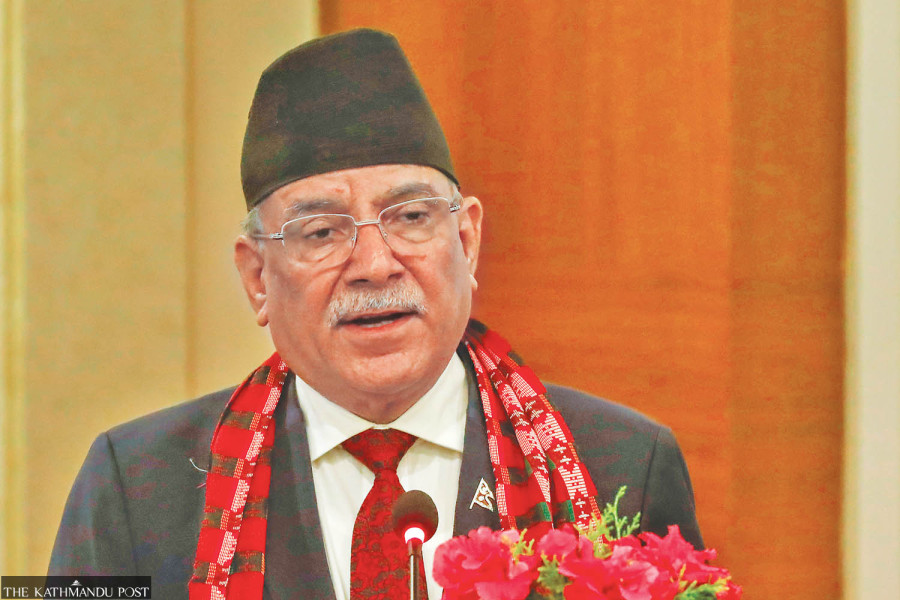National
Transitional justice remains elusive despite government’s repeated pledges
The current bill shields perpetrators and needs to be amended, allege experts.
Post Report
While there is no one-size-fits-all model in the transitional justice process, all countries need to follow specific international standards, according to international human rights experts.
Addressing an event in the Capital on Monday, they said transitional justice is a complex process and must be based on the justice dispensed in particular countries. "All countries have something in common," said Santiago A Canton, secretary general of the International Commission of Jurists (ICJ). "Also, there are international standards and obligations to abide by. Nepal can be a role model for all the countries if it concludes the ongoing transitional justice process [fulfilling due standards]."
The ICJ and the Advocacy Forum jointly organised the discussion on "Sentencing Regime on Transitional Justice", bringing together experts at a time when a parliamentary committee is working on the bill to amend the Enforced Disappearances Enquiry Truth and Reconciliation Commission Act.
The victims of the decade-long Maoist insurgency, human rights defenders and national and international human rights organisations have suggested several revisions to the bill, arguing they are aimed at shielding the perpetrators against prosecution. The ruling parties are still reluctant to revise the bill as suggested.
"The bill continues to undermine the government’s international obligations and the 2015 verdict of the Supreme Court," said Mandira Sharma, senior international legal advisor to the ICJ. "If we don’t adopt the proper process and deliver justice here, justice will be sought from outside the country. This is an issue of international jurisdiction."
Several human rights and victims’ organisations have submitted reports suggesting legal amendments. Lawmakers have registered 27 amendments to the bill based on suggestions from the stakeholders.
The United Nations Resident Coordinator’s Office also provided advisory notes to the Nepal government regarding the amendment bill. The note, according to the UN, is aligned with international norms and standards and the court verdict.
The government's initiative to amend the transitional justice Act can support the implementation of the recommendations and the Supreme Court stand of 2015 and Nepal’s international obligations, said Hanna Singer Hamdy, the UN resident coordinator in Nepal. It is also important to ensure a victim-centric transitional justice approach, she added.
Hamdy, however, said transitional justice is context-specific, considering the political and societal reality of the particular country. "It [conclusion of transitional justice] is doable. Yes, I am sure that will happen," she added.
Expressing his views at the programme, former Nepal Chief Justice Kalyan Shrestha said the armed conflict led to several political achievements, but the victims of the conflict have been denied justice for years.
Shrestha also claimed that Nepal had developed its jurisprudence through the Supreme Court, which had also been welcomed by the international community. In 2015, his bench struck down the amnesty provisions in the Act, directing the government to carry out necessary amendments. The court's directives remain unaddressed.
"It is necessary to demonstrate generosity and courage in revising the bill to make it acceptable to all. Let's then appoint the office bearers in the two commissions, adopting transparent means," said Shrestha. "The parliament must not be a platform to promulgate unfair laws that shield the perpetrators."
Responding to the concerns, Prime Minister Pushpa Kamal Dahal on Monday vowed to conclude the transitional justice process through a credible process.
Dahal reiterated that his government was committed to establishing a credible transitional justice process to seek the truth, provide reparation to the victims and bring the perpetrators of serious human rights violations to justice. "The Comprehensive Peace Accord, the directives of the Supreme Court, and relevant international commitments, as well as the concerns of the victims, will be taken into consideration while finalising the bill," said Dahal.
Despite repetitive public commitments by successive governments, including the one currently led by Dahal, they have paid little attention to amending the Act in line with the court’s directive. The revision bill registered by the Dahal government is being reviewed by a sub-committee of the Human Rights and Law Committee of the House of Representatives.
"The new constitution itself is a product of the peace agreement, which incorporates almost all human rights enshrined in the international human rights law. The immediate enforceability of the constitution's economic, social and cultural rights can be marked as a major achievement,” said the prime minister. “These constitutional promises were possible only because of the people's movement and the people's war. We also successfully integrated former [Maoist] combatants into the Nepal Army and society. However, we are yet to address past human rights violations."
The conflict victims, however, remain sceptical. “At every platform, the political leadership promises the conclusion of the transitional justice process and justice for the victims but that merely has proved to be lip service,” said Suman Adhikari, founding chairman of the Conflict Victims' Common Platform. “We are running out of patience. We need action now.”




 9.7°C Kathmandu
9.7°C Kathmandu













